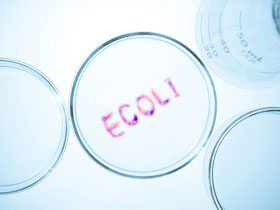
Differences between E.Coli & Salmonella
We have all heard that E-coli and Salmonella contaminate our food, but we have never been too fussed to find out what they actually are. Are they the same thing or are they even have any common with each other? Let’s find out!
Salmonella and E.coli are the same in the sense that they are both bacteria, but are in fact completely different types of bacteria. Salmonella is the name of the group of over 2,500 types of bacteria that most commonly causes food poisoning in humans and animals. Salmonella is spread by ingesting foods that are contaminated by salmonellae such as raw eggs, raw meat, eggs, fruits, vegetables, and contaminated water. Contamination takes place when these foods come into contact with animal or human feces and are not cooked properly. Symptoms of Salmonella are diarrhea, vomiting, fever, cramps, headache, and lasting around 4-7 days. Symptoms can get more serious in infants and the elderly but will eventually go away by themselves. If symptoms persist for more than 3 days and do not improve, a fever higher than 102 Fahrenheit, bloody stools, or signs of dehydration, then professional medical assistance should be involved.

E-coli is the name of the bacteria that live in the intestines without (Most of the time) causing any problems. However, several strains of E-coli can cause food poisoning and result in serious issues were bleeding and hemorrhaging occurs. You can get E-coli by eating foods that have been improperly processed or harvested that may have come into contact with animal or human feces. Other causes include contaminated water and person-to-person contact. Contaminated water includes untreated private well water, not properly maintained pool water, etc. Personal contact is also another transmitting source of E. coli, this mainly comes from not washing hands after touching contaminated surfaces. Most commonly, E-coli is recognized by those having symptoms that involve bloody stool, in which case these people should be taken to immediate hospital care.
Salmonella and E-coli outbreaks are both rooted in the contamination of feces but are different bacteria that pose different risks. Now that you have educated yourself on the differences, it is most important to keep yourself healthy and free from these bacteria.
How to protect yourself
The best way to avoid any infection from E-coli and Salmonella is to maintain hygiene. Always thoroughly wash your vegetables and fruits as they may have come into contact with dirt that may have been contaminated by feces. In fact, E-coli and Salmonella can be passed by a simple shake of a hand from someone who hasn’t washed their hands after relieving their bowel. Thus, always wash your hands before eating.
Secondly, it is always important to cook your meat thoroughly, especially chicken. Those who love to have their meat nice and rare, pose a risk of catching one of these infections. Lastly, it is important to maintain clean drinking water in your household so that your family does not consume E-coli or Salmonella from your water source. Bottled water or a purified drinking water system will be your best bet to safe water!
Read Next: Tips on Protecting Your Home from E coli





